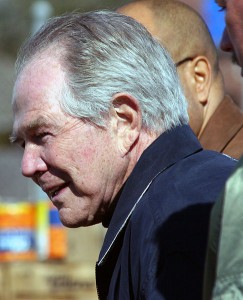Gaza
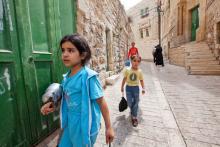
In the Judeo-Christian tradition, God calls us to love and show compassion to the stranger, particularly those who suffer. But first, they must become real to us. And there is nothing more viscerally real, perhaps, than the face of a dead child.
Is it possible to let our hearts by broken by the dead children of our enemy? Is our God big enough to allow us to imagine that God loves those we fear and despise?
Not until, I believe, they have faces.
Iraq, Syria, Ukraine, Israel, Gaza – though religious fervor is alive and well in these embattled areas, loathing, horror, and hatred seem to reign, darkness to rule. In the grim night, we cannot see each other’s faces.

The first thing that visitors and volunteers see at the Tent of Nations just outside of Bethlehem is a large stone on which are written the words, “We refuse to be enemies.” As Israeli settlements draw ever closer to their land and the Israeli Defense Forces destroy their orchards, the Nassar family continues to pay a heavy price in their practice of Jesus’ teaching, “Love your enemies, do good to those who hate you, bless those who curse you, pray for those who abuse you (Luke 6:27-28).”
The Nassars refuse to divide the world into friends and enemies, challenging the rest of us to do the same.
As a Christian, I was raised to be pro-Israel. Since going to the region many times, I’ve become pro-Palestinian and pro-peace, too, which has led me to explore the narratives of Palestinians as well as Israelis. I grieve the deaths in both Israel and Palestine. Every human life has extraordinary value. The loss of even one life is a loss to all of us.

When the Word becomes flesh, when the Son of God becomes one who bleeds, Jesus demonstrates God's humble solidarity with human nature from Adam and Eve onward, to the last person born in history.
This vulnerability of God for us, this identification of Jesus with our collective human frailty, changes our perspective on everything. In the light that shines from the face of Jesus Christ, we at last see God and humanity with 20/20 vision.
Paul comes to this vision late in the day, well after the events of God in the flesh that reconcile the Father to God's creation. The vision of Jesus blinds him but when his eyes are healed, having seen Jesus, he sees God and humanity and the world very differently than he did before the vision of Christ that overwhelms him.
Years later, in a letter to the Corinthians, speaking about the church's worship with blest eyes he writes: "When we drink from the cup we ask God to bless, isn't that sharing in the blood of Christ? When we eat the bread we break, isn't that sharing in the body of Christ?"
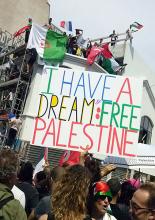
Amid mounting protests in Europe against the Gaza conflict, political and religious leaders in the region have sharply denounced anti-Semitism within their borders.
“Anti-Semitic rhetoric and hostility against Jews, attacks on people of Jewish belief and synagogues have no place in our societies,” the foreign ministers of France, Germany, and Italy said in a statement Tuesday from Brussels.
Fears of escalating unrest are perhaps sharpest in France, home to Europe’s largest populations of Jews and Muslims. Many have roots in North Africa, and violence in the Middle East resonates strongly here. Thousands defied a government ban against Paris-area protests over the weekend, staging pro-Palestinian rallies that degenerated into violence.
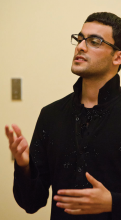
THE ULTIMATE BRAVERY might well be the courage to forgive one’s enemies and hold on to hope.
Nelson Mandela famously emerged from 27 years in prison as a reconciler and uniter, somehow free from bitterness and hatred. He was able to put into practice Jesus’ call to love our enemies—and thus became the father of the new South Africa.
Far from the upper echelons of power and fame, forgiving our enemies can be a difficult task, since “enemies,” by their very definition, aren’t easy to love. But in places of oppression, occupation, and routine violence, it’s even harder.
Take, for example, the story of a young man named Yousef Bashir. He grew up in the Gaza Strip, near an Israeli settlement known as Kfar Darom. In 2000, Palestinians rose up in protest against the Israeli occupation in what became known as the Second Intifada. In response, Israeli soldiers came to Yousef’s house and told his family to leave.
His father had dedicated his life to teaching Yousef and his brothers “how to coexist with the Israelis,” Yousef explained over lunch in Philadelphia early this winter, and he insisted on staying in their long-time family home. As a result, Yousef said, Israeli soldiers moved into the Bashir family’s house when he was 11 years old. They occupied the house until he was 15.
When most people think of Gaza, surfing is not the first thing that comes to mind. But photo journalist Ryan Rodrick Beiler has an eye for capturing the resilience and richness of life in this occupied land.
IN "SILENCE FOR GAZA,” Palestinian poet Mahmoud Darwish captures the contradictions of the coastal enclave, describing it alternately as “ugly, impoverished, miserable,” and “the most beautiful, the purest and richest among us.” Darwish’s antonyms evoke Gaza’s crushing conditions and resilient residents, exemplars of sumud, an Arabic word roughly translated as “steadfast perseverance”—a fundamental form of Palestinian resistance. Darwish’s poem also states that Gaza “did not believe that it was material for media. It did not prepare for cameras and did not put smiling paste on its face.” And yet every person, every story, every image of Gaza illustrates this persistent paradox of a land at once ugly and beautiful.
“I DON’T KNOW why they targeted us. No rockets were fired from our neighborhood,” says citrus farmer Yusuf Jilal Arafat, whose 5-year-old daughter Runan was killed when Israeli warplanes bombed their home. Arafat’s wife, four months pregnant, and their 8-year-old son were found alive in the rubble. His surviving children now suffer from frequent panic attacks at night. Many of Arafat’s trees were destroyed by the bombs, and the ground is covered with oranges now in various stages of decay. Rumors of contamination by Israeli weapons may hurt the sales of his crop, but he will still harvest. The family is living with Arafat’s father-in-law until they can rebuild.
Rebuilding under Israeli import restrictions is no simple task, so salvaging existing materials remains a vital practice—albeit risky, according to structural engineers. But ingenuity-by-necessity is constantly on display in Gaza, whether it’s recovering crushed stone from beneath ruined highways, straightening steel rebar from bombed-out buildings, or pulverizing concrete for reuse in new (but weaker) blocks.
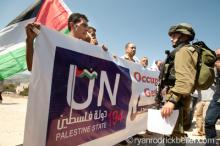
On Nov. 29, Palestinians will bid to become a “non-member observer state” in the United Nations. If approved, this would be a major step toward full statehood for Palestinians. Israel, and perhaps more important, the United States, are against this move, not least for fear of possible war-crime investigations against Israel. Israel’s rationale has always been that a final resolution cannot be achieved unilaterally, but only through direct negotiations. Ironically, Israel achieved its own independence unilaterally and through the United Nations.
Palestinian Christians leaders have sent a strong message of support for this step. A statement signed by 100 community leader says:
We believe the Palestine Liberation Organization’s initiative to enhance Palestine’s status in the United Nations to an Observer State is a positive, collective, and moral step that will get us closer to freedom. This is a step in the right direction for the cause of a just peace in the region. We fully endorse this bid, just as we supported Palestine’s application for full membership of the United Nations a year ago.
There are multiple news reports that an Israeli air strike has killed senior Hamas military commander Ahmed al-Jabari in Gaza City. The Associated Press is reporting that, “The Israeli military says its assassination of the Hamas military commander marks the beginning of an operation against Gaza militants.”
Al Jazeera adds that Palestinian security sources reported a total of four air strikes across Gaza late Wednesday afternoon. A BBC reporter in Gaza City says the sound of gunfire echoed through the streets after the air strike. This follows several days of cross border attacks by Hamas on Israel and Israeli retaliation.
Haaretz is running a live blog, and on Twitter #Gaza, there are live reports of continued shooting and explosions from further air strikes.
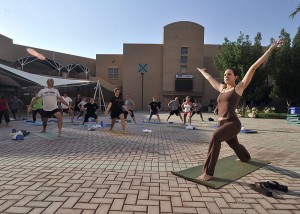 Just a few days after I returned from my respite in the mountains, Israeli forces killed eight Turkish nationals and one American on a Gaza-bound aid flotilla. Protests erupted all over Israel and Palestine.
Just a few days after I returned from my respite in the mountains, Israeli forces killed eight Turkish nationals and one American on a Gaza-bound aid flotilla. Protests erupted all over Israel and Palestine.
In the midst of this tragic chaos I found myself visiting my yoga center more often than usual, hoping to find another glimpse of the peace I had tasted so vividly just a few days before. Perhaps these wise, centered people could offer a perspective that would look forward to a vision of understanding, or reconciliation -- a vision too often missed by politicians, military officials, media, and even activists.
The scenes were stunning: Hundreds of demonstrators pouring across the fence between Syria and the Israeli occupied Golan Heights.
For nearly six years, the Palestinian residents of the West Bank village of Bil'in have held a weekly nonviolent demonstration against the separation wall -- a barrier cutting through large portions of
